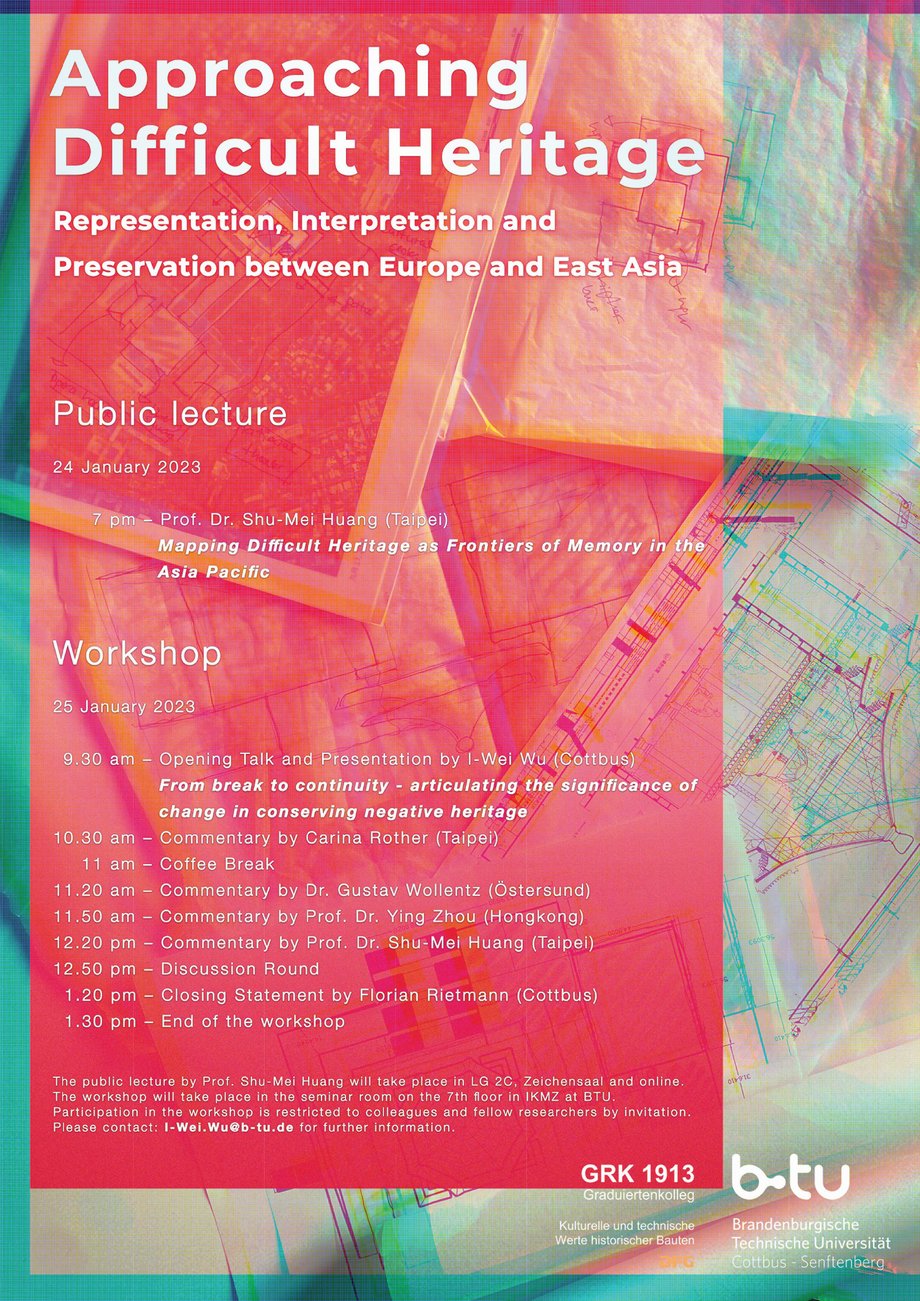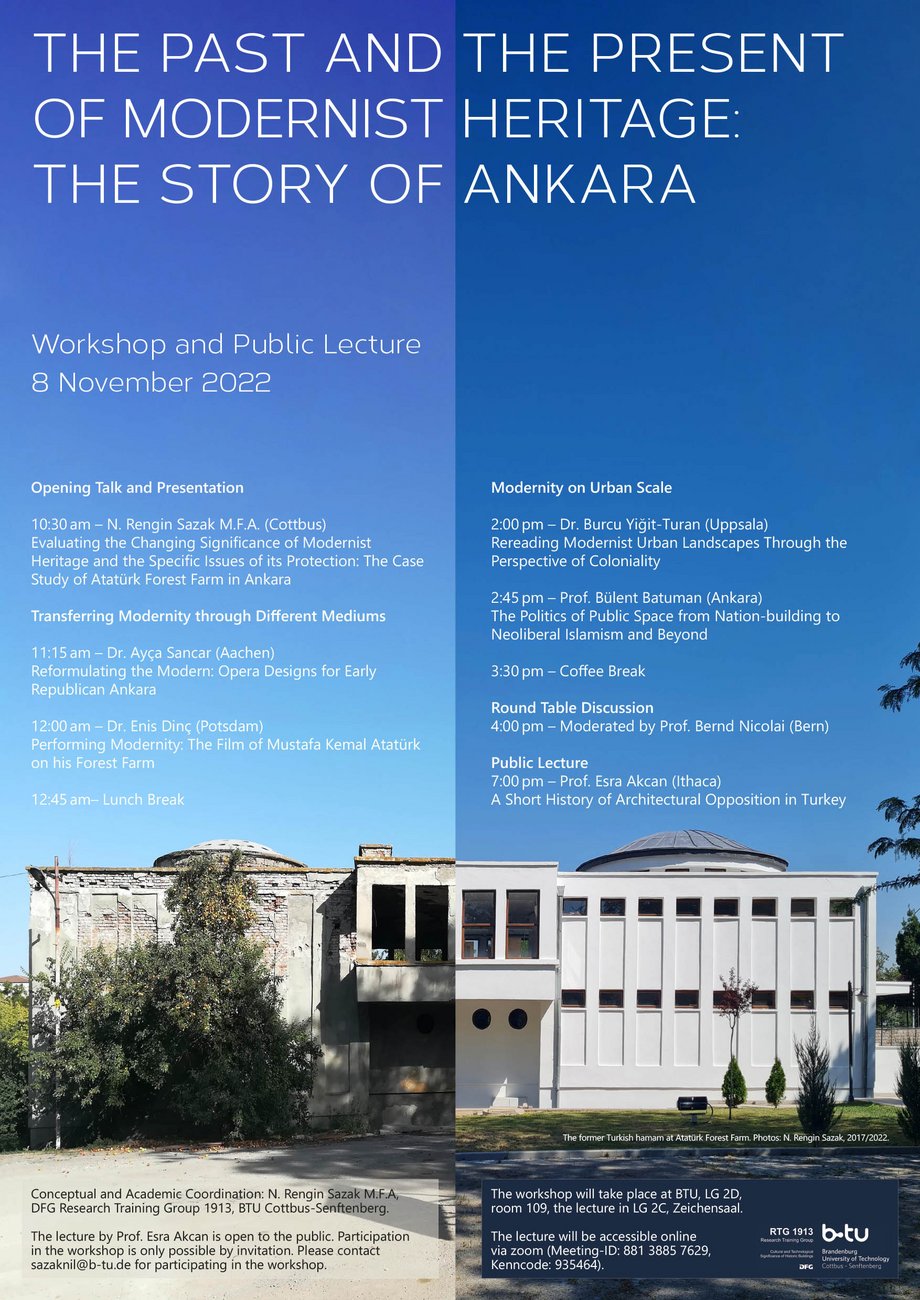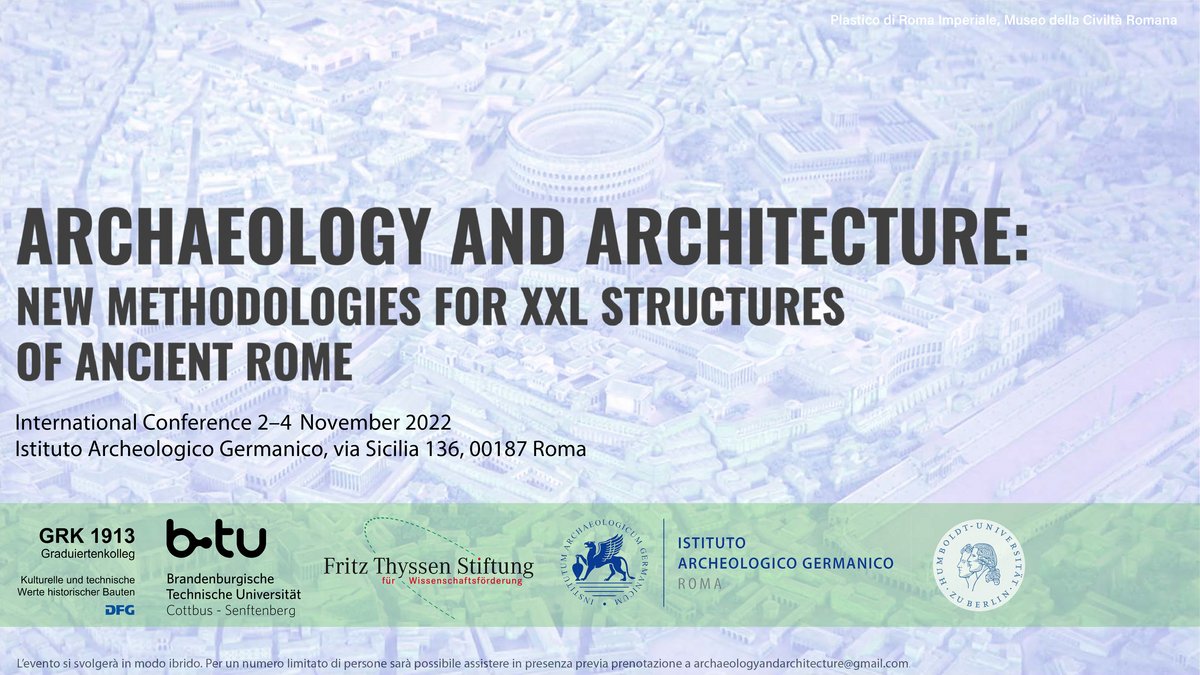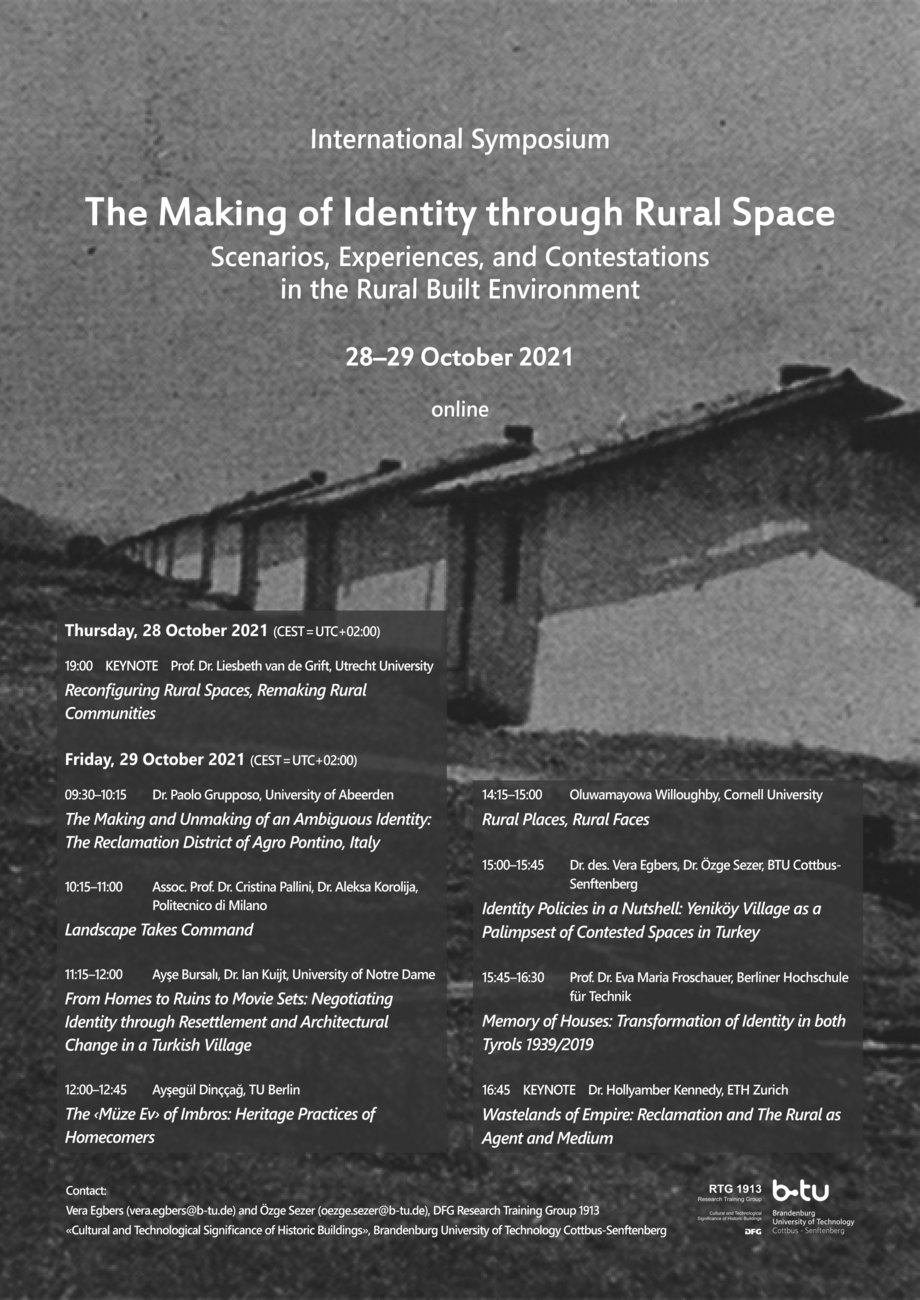Symposia and Workshops
The internationally oriented symposia serve to discuss key questions and safeguard the results of the postdoctoral tandems sponsored by the Research Training Group for two years. For this purpose, international experts are invited to the interdisciplinary topics and thereby complement the topic area, which is being worked on by the postdoctoral researchers, with their own viewpoints and disciplinary perspectives. Above all, the symposia seek to intensify the discourse between the engineering and humanities on specific research topics, thereby contributing to their interdisciplinary positioning. The results of the symposia will be published in the publication series of the Research Training Group at Birkhäuser Verlag.
The workshops are launched on the initiative of the doctoral students of the DFG Research Training Group and serve to enrich the respective research projects by incorporating new research perspectives, comparatively analysing sources and materials and involving further partners in the work of the Research Training Group. The workshops, which are held as half-day or full-day events, are led by the doctoral students and focus on key questions that arise from the individual doctoral projects.
Approaching Difficult Heritage: Representation, Interpretation and Preservation between Europe and East Asia Public Lecture and Workshop, 24 and 25 January 2023, BTU Cottbus-Senftenberg

There is a growing interest in researching difficult heritage. The shifting attitudes towards critical perspectives within the field of heritage studies can be understood as a way of searching for new research paradigms or models. Dealing with difficult heritage sites for contemporary needs is one of the predominant challenges that post-conflict societies face today. This involves the challenges of representing contested histories between differing social or political actors, interpreting the history and meanings of places, and deciding how to preserve the architectural embodiments. Although the processes are complex, they simultaneously offer a multitude of possibilities for bringing about epistemological, methodological changes. Threshold of changes revolves around these central questions: How is the difficult past interpreted and how are memory narratives re-shaped? What attempts have been formulated to respond to the temporal and complex layers of a difficult heritage site? How can we understand human interaction with these sites over different time periods that might challenge a linear understanding of the concept of time? The workshop "Approaching Difficult Heritage. Representation, Interpretation and Preservation between Europe and East Asia" welcomes knowledge exchange beyond the European context by gathering scholars who have conducted case studies in Europe and East Asia, including Prof. Shu-Mei Huang (Taipei), Prof. Ying Zhou (Hong Kong), Dr. Gustav Wollentz (Östersund), Carina Rother (Taipei), Florian Rietmann (Cottbus). Together with the invited scholars, the workshop will facilitate discussions and commentaries on I-Wei Wu's research project entitled "From break to continuity: articulating the significance of change in conserving negative heritage" and bring in findings from different contexts. In doing so, it aims to deconstruct the tasks involved in dealing with such sites by bringing a variety of insights to approach the notion of difficult heritage.
Conceptual and Academic Coordination: I-Wei Wu (M.A., M.Sc.), PhD Candidate at the Heritage Studies programme and the DFG Research Training Group 1913, BTU Cottbus-Senftenberg
The public lecture by Prof. Shu-Mei Huang will take place in LG 2C, Zeichensaal and online.
The workshop will take place in the seminar room on the 7th floor in IKMZ at BTU. Participation in the workshop is restricted to colleagues and fellow researchers by invitation.
Please contact I-Wei.Wu(at)b-tu.de for further information.
The Past and The Present of Modernist Heritage: The Story of Ankara Workshop and Public Lecture, 8 November 2022, BTU Cottbus-Senftenberg

Ankara was a small central Anatolian town until it was declared the capital of Turkey in 1923 and after that, a mass transformation process in this small town started. Starting from the 1920s, architects and urban planners from Europe, especially from German-speaking countries, were invited to create the new silhouette of the city by using the architectural approach of that time, “modernism”, with a strong emphasis on building a nation-state. The modernist architecture was highly used for representing the Republican values and the new ideology, and between the 1920s and 1940s, the whole city plan, the landscapes, residential areas, governmental and institutional buildings, and universities were designed by architects and urban planners such as Clemens Holzmeister, Bruno Taut, Paul Bonatz, Martin Elsaesser, Carl Christoph Lörcher, Hermann Jansen, and Ernst Egli. This constant transformation of the city formed the backbone of the young capital and made Ankara a modernist phenomenon in the history of urban planning and architecture.
This workshop aims to bridge the past and present of these buildings by reassessing them in their historical context and raising new questions about the current situation of these buildings and their changing significance. The usage of modernism in the Early Republican period and transferring it via diverse mediums such as movies and on different scales such as landscapes or architecture, will be reassessed through the case of Ankara. Different examples of modernist heritage from the capital will be presented in a historical perspective by scholars from the field. In the second part of the workshop, protection issues of this heritage will be examined and the ideological position of this heritage in the recent political atmosphere will be discussed. Overall, a story of an era will be told with new narratives and recent changes about this heritage.
Conceptual and Academic Coordination: N. Rengin Sazak (M.F.A), PhD Candidate at the Heritage Studies program and Associated PhD Candidate at the DFG Research Training Group 1913, BTU Cottbus-Senftenberg
The lecture by Prof. Esra Akcan is open to the public. Participation in the workshop is only possible by invitation. Please contact sazaknil(at)b-tu.de for participating in the workshop.
The workshop will take place at BTU, LG 2D, room 109, the public lecture will take place at 7 pm in LG 2C, Zeichensaal and online via zoom.
International Conference “Archaeology and Architecture: New Methodologies for XXL Structures of Ancient Rome” 2–4 November 2022, DAI Rom
Objects of the conference are modern methodologies and techniques for studying Ancient Roman Architecture, with specific consideration of XXL structures. In the last years as never before, the technological development determined an enormous improvement in the analysis of ancient architectural sites. For the first time, one researcher can control the entire workflow, even in surveying big buildings, huge archaeological sites, or very articulated architectures.
The conference “ARCHAEOLOGY AND ARCHITECTURE: NEW METHODOLOGIES FOR XXL STRUCTURES OF ANCIENT ROME” will gather a group of international and interdisciplinary young researchers to share their own ongoing projects. The case studies will offer the opportunity to discuss theoretical approaches, methodologies, techniques, and future developments of the complex system of Roman architecture.
The conference was organized by Fabrizio Sommaini, doctoral student at DFG Research Training Group 1913 “Cultural and Technological Significance of Historic Buildings”, BTU Cottbus-Senftenberg and HU Berlin, with Klaus Rheidt and Janet DeLaine. Conference sessions will be chaired by Evelyne Bukowiecki, Heinz Beste, Maura Medri. The event will take place at the German Archaeological Institute Rome and is funded by Fritz Thyssen Stiftung.

International Symposium “The Making of Identity through Rural Space: Scenarios, Experiences and Contestations in the Rural Built Environment”
28–29 October 2021, online
Rural space has played a substantial role in several social, cultural, economic, and ideological transformations through time. Such transformations are being studied through various scientific concepts. Among others, the implementation of new concepts that focus on shaping identities through the reproduction of spatial agents belonging to rural communities by direct and indirect political interventions remains crucial to grasp a broad understanding of these particular changes.
However, studies on the formation of identity through space have been primarily handled in the frame of urban studies until recent years. Yet, the various identity-making practices have certainly had significant influences on and through the rural built environment. In this symposium, we reopen the discussion of the making of identity in rural areas, which have dramatically changed under different political, social, and economic conditions from the verge of the 20th century until today, and potential contested spaces as traces of this process. We thereby seek a better in-depth understanding of spatial dynamics related to the specific cultural and social spheres of 20th’s century rurality.
The symposium took place as an online event, starting with an evening lecture on Thursday, 28 October.
Concept and organisation: Vera Egbers (vera.egbers(at)b-tu.de) and Özge Sezer (oezge.sezer(at)b-tu.de)
The conference report written by Dr. Firuzan Melike Sümertaş can be found as a pdf file under this link.

